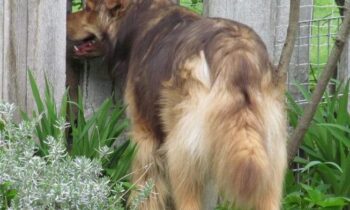
Spokane, Washington—We’re suffering this spring from an unusually awful infestation of black flies. The little devils are biting not only us humans but also our pets, primarily our dogs. I’m itching myself from a morning of mowing my lawn—bites on the back of my neck where I can’t even see them. I found blood in my hair last night and hunted down the bumps on my scalp. Itch-stopping cream helps a lot, but I’d much prefer not being bitten at all, thank you very much, black flies.
It could be worse: “[I]n parts of the upper Midwest and the Northeast, black fly biting can be so extreme, especially in late spring into early summer, it may disrupt or prevent outdoor activities such as hiking, fishing, and kayaking,” according to the Entomology Department at Purdue University.
https://extension.entm.purdue.edu/publichealth/insects/blackfly.html
Farmers’ Almanac even calls black flies “malevolent.”
Mosquitoes are a much-dreaded fact of summer throughout the world, but anyone who enjoys the outdoors in Canada and the northernmost U.S. states knows that the real enemy of the wilderness wanderer is the malevolent black fly.
Black flies, also known as buffalo gnats or turkey gnats, are small flying insects that feed off the blood of humans and other animals. Though tiny—they reach a maximum length of 1/8″ when fully-grown—black flies are a formidable foe.
Most prominent beginning in about the middle of May, and continuing to make the outdoors a miserable place to be well into June, or even July, black flies do not spread disease among humans, though their bites are painful, itchy, and slow to heal. They can cause severe allergic reactions in some, up to and including death. Because black flies tend to swarm their prey, a single victim can receive numerous bites in a short period of time, increasing the likelihood of a dangerous reaction. For this reason, some U.S. states try to control black fly populations for public health.
The Spokane Regional Health District has more information about black flies and their bites:
Black flies are small, biting flies that are a nuisance to people and animals living, working, or playing near running rivers and streams. Black flies are sensitive to weather conditions. They are most active on cloudy, humid days with low wind.
These flies are typically dark in color and some species are also referred to as ‘punkies’ or ‘no-see-um’s.’ On people, they crawl into sleeves, under neckbands, around boot tops and other vulnerable places, especially favoring the head just beneath the rim of a hat. Bites can cause swelling and numb soreness for many days.
The painfully itchy bite of the black fly is created when it cuts a hole in the skin to suck blood from animals and people. The flies attack around the eyes, ears, scalp and occasionally on the arms and exposed legs. The pain and swelling of the bite are due to the body’s allergic response to the fly’s saliva that they inject when feeding. Fortunately, black flies do not transmit any diseases to humans in Washington state, but can cause discomfort and irritation.
Southcare Veterinary Clinic in Spokane describes the effect of black fly bites on our pets:
Black flies tend to bite our pets’ underbelly and groin regions, or ears of critters whose ears stand up. The large welts that are left behind are quite distinctive. A bright red circle about the size of a nickel are usually found in places where the fur is thinner.
Here is a photo of a Spokane dog affected by black fly bites:

Photo by Jamie Wilke
Farmers’ Almanac has suggestions for keeping black flies away from you and yours.
Repelling Black Flies
Black flies can be difficult to repel. The simplest way to prevent getting bitten is to protect your skin by wearing long sleeves and pants at all times when outdoors. Because they are attracted to dark colors, it’s also a good idea to wear light-colored clothing, such as khaki, tan, or white.
One particularly annoying habit of black flies is their tendency to swarm the face. This occurs because they are attracted to the carbon dioxide we exhale. A good way to protect your face is to wear a hat with attached netting, specially designed to protect the head and neck from black flies.
Some recommended natural repellants include vanilla extract, lavender, and the extract from pine branches—just break open a young branch and rub the moisture from inside on your skin.
Avoiding wearing sweet-smelling perfumes or indulging in candy or soft drinks when outdoors can also help to reduce your risk of attracting black flies.
Peteducation.com from Doctors Foster and Smith makes some additional suggestions for keeping your pet from getting black fly bites:
- Moving the pet indoors during the heat of the day also will help.
- Spraying the dog’s outside living quarters will also help keep fly numbers to a minimum.
- Remove any materials which may attract flies; e.g., fecal material, uneaten pet food, garbage, etc.
- Keep your pet clean and well-groomed, removing any urine-soaked or fecal-contaminated hair.
Farmers’ Almanac suggests what to do for humans who’ve been bitten by black flies:
Soothing the Itch
If you do get attacked by black flies, there are a number of things you can do to soothe the itch:
- Wash the affected area with soap and warm water
- Avoid scratching the bites as much as possible. Scratching can break the skin, increasing the risk of infection.
- Apply a topical agent, such as aloe vera, witch hazel, or a gentle over-the-counter remedy, such as calamine lotion, which can also help. If the itching persists, or is very bad, an antihistamine cream may be needed.
Southcare Veterinary Clinic has advice especially for pets:
If you find black fly bites on your pet, the good news is most pets don’t mind them. Even though these welts may look irritated and sore, they do tend to disappear over time. Some pets may be more sensitive to these bites than others and can develop a skin infection. Signs of this may include irritation of the skin, and/or excessive licking and chewing at the site of the bite.
I like the idea of natural repellents because they’re unlikely to cause harm and, if they work, they’ll protect you and your pets. Local dog lovers are recommending lavender and sandalwood used in a diffuser for decks and porches; they’re spraying themselves with oils of lavender, sandalwood, or vanilla (humans only, I think). I might try the suggestion of breaking open a young pine branch and squeezing the liquid onto my skin. I might even use it on the underbelly skin of my dog, as long as there’s no pine pitch involved.
Your veterinarian can tell you what’s safe to experiment with—call and ask!
Most important: if your pet has been bitten by black flies and appears to be suffering from the bites, contact your veterinarian immediately. A clinic visit may be advisable so that your veterinarian can assess the seriousness of the reaction.
Want to know more about rewarding your dog for making good choices? I will be teaching a free class in Spokane next month and, if you’re in the area, I hope you will attend!
DOGS—LIVING WELL WITH YOUR BEST FRIEND
Monday, June 5, 2017, 6:30–7:30 p.m.
South Hill Library, 3324 South Perry Street, Spokane, Washington 99203
Families, school-age kids (K–5th grade), tweens (5th–8th grade), teens (13–18 years), adults
Dog training is no longer a matter of punishment, force, and fear. Today’s dogs learn to make the right choices because they’re trained with positive, force-free methods that shape their behavior with rewards. What is rewarding to your dog? Val will help you to figure that out! Do you have concerns about your dog’s care and feeding, manners, bad habits or anxieties? Val will be available to answer your questions before class, from 5:30–6:30 p.m., so join us early if you can! Families are welcome.
http://www.spokanelibrary.org/calendar/?trumbaEmbed=view%3Devent%26eventid%3D123527681



